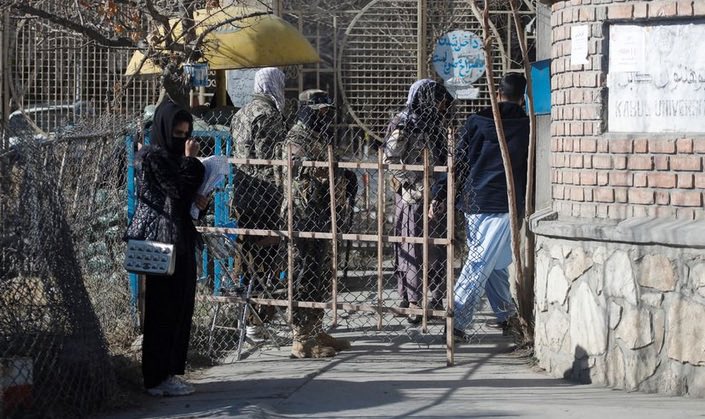In the midst of deteriorating humanitarian conditions, NGOs have been offering support and services in areas of healthcare, education, child protection, and nutrition.
Qatar’s foreign ministry has expressed “extreme concern” over the Taliban decision to forbid female employees from working with non-governmental organisations, calling on authorities to reconsider their course of action, according to a released statement.
The ministry said it “stresses the need to respect women’s right to work, given that the freedom to choose and accept work is a human right.”
The Taliban‘s decision has triggered global outrage and forced four significant international aid organisations to suspend their operations in Afghanistan.
Without women in their workforces, Save the Children, the International Rescue Committee, the Norwegian Refugee Council, and CARE said on Sunday they could not effectively reach people in need. The NGO ban was announced a day earlier, allegedly as a result of women not properly donning the Islamic headscarf.
The International Rescue Committee, which employs more than 3,000 women in Afghanistan, expressed shock at the Taliban’s choice. In a statement announcing its decision to halt operations in the nation, the organisation claimed “if we are not allowed to employ women, we are not able to deliver to those in need.”
The order for NGOs came from the Taliban’s Economy Minister Qari Din Mohammed Hanif, in a letter on Saturday. Any organisation found to be disobeying the order would have their licence revoked, according to the letter.
The Norwegian Refugee Council had 468 female employees in Afghanistan, according to Neil Turner, the country’s chief.
“We have complied with all cultural norms and we simply can’t work without our dedicated female staff, who are essential for us to access women who are in desperate need of assistance,” Turner said.
The International Committee of the Red Cross issued a statement warning that women’s exclusion from Afghan schools and NGO work “can and will have catastrophic humanitarian consequences in the short to long term.”
This week, the Taliban also forbade female students from enrolling in universities across the nation.
Worsening economic state
In the midst of deteriorating humanitarian conditions, the four NGOs have been offering support and services in areas of healthcare, education, child protection, and nutrition.
After the Taliban overthrew the government in August 2021, Afghanistan underwent a radical economic transformation that left millions of people in a state of extreme poverty and hunger.
Foreign aid virtually disappeared overnight with the international community breaking off all funding with the radical group.
Access to international organisations and funds from outside that financed Afghanistan’s aid-dependent economy prior to the withdrawal of US and NATO forces have already been hampered by sanctions against the Taliban leadership, a ban on bank transfers, and the freezing of billions in the country’s foreign exchange reserves.
In an interview with the AP last month, Martin Schuepp, a senior Red Cross official, predicted that as living conditions worsen in the coming year, more Afghans would struggle to survive.
According to the organisation, 24 million Afghans, or 50% of the country’s population, require humanitarian assistance.
Protests around the country
The prohibition on female students attending universities led to protests in a number of Afghan cities and international backlash.
In support of female students, people in the western city of Herat opened their windows at around midnight on Saturday and chanted “Allahu Akbar” (God is great).
On Saturday, hundreds of male students at Mirwais Neeka University in the southern city of Kandahar boycotted their final semester exams.
As they left the exam room, one of them told the Associated Press that Taliban forces attempted to disperse the crowd – a claim that was confirmed after footage emerged online.







